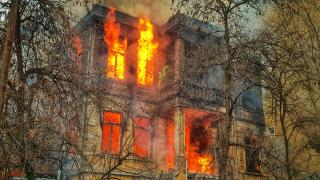Loss adjuster Woodgate & Clark has warned commercial property clients to increase their vigilance after the firm’s investigators found that cannabis factories were behind a number of recent property claims.
Woodgate & Clark’s Head of Counter Fraud Marie Quinn said, “As lockdown measures have eased, we have seen a growing trend in fire and malicious damage claims across a number of insured property schemes which have arisen from the illegal cultivation of cannabis”.
She cited a recent £1m fire claim, where investigators found that the fire was caused by faulty electric wiring as a result of internal alterations by two tenants who were growing cannabis in adjoining terraced houses.
She said: “This was a catastrophic fire that badly damaged a block of three terraced properties, which thankfully were unoccupied at the time. The council issued a dangerous structure notice and insisted the roof be removed and fencing erected for public safety. “
She explained that the tenancies were arranged through a managing agent who outsourced the tenant references to a third party who failed to spot that the references were fake.
Police are investigating, as there are suspected links to organised crime. Many drug dealers employ illegal immigrants to ‘farm’ the plants. During the pandemic links to modern slavery and exploitation increased by 95%.
For the cannabis cultivation process, the electricity, gas and water supply are hacked into the mains. This means the drug dealer does not pay for any of the utilities. It is this process of bypassing of electricity in particular that gives rise to the risk of fire.
Official statistics show that between 2015 - 2020, the number of cannabis farms detected in the UK increased by more than 150%, with criminals shifting away from large farms to smaller scale production. According to reports, 94% of cannabis farms are now located in domestic premises and around 25 farms or factories are being discovered by police per day.
In the past 12 months, cannabis farms have been found in some unlikely locations including a large partially occupied office complex, a pub basement, a light industrial unit situated next door to a Police Station and a large unoccupied country mansion. Empty city centre commercial properties have provided unexpected opportunities for criminals, with people working from home.
Police have reported a rise in the number of ‘tip offs’ with more people staying at home. In May 2020, one police force seized £3m of cannabis plants; an increase of 280% on the same period in 2019.
Landlords who have been the victims of this type of criminal activity have reported the following types of damage to their properties:
• Ceilings and walls knocked through and floorboards ripped out
• Severe water damage
• Fire and explosion
• Furniture destroyed or thrown away
• Wiring ripped out
• Electricity meters bypassed
Marie said: “The pandemic reduced the number of regular landlord inspections. We are warning our property clients to make doubly sure that tenants have the right credit and reference checks, and that regular inspections are reinstated, especially now the pandemic restrictions have eased.”
She added: “Some policies give cover for malicious damage, but others include exclusions, such as damage arising from any criminal activity or malicious damage caused by tenants. It is therefore vital that clients carefully check policy wordings as well as carrying out routine checks we are advising clients to:
• Be extra cautious when they have a potential tenant who wants to move in quickly, and as an inducement, may offer to pay 6 or 12 month’s rent in advance
• Be aware if the tenant is too keen to take up the tenancy without really checking the property you are letting
• Consider visiting the prospective tenants at their current address if they live in the locality
• Request photographic evidence of their identity
• Check the documents provided by the tenant to see if they are forged
• Not to accept cash for the rent or the deposit
How to spot a cannabis farm:
• Strong, pungent smell
• Windows painted or curtains permanently closed
• Physical security outside
• High levels of condensation
• Lots of visitors/activity at the property, and at unsociable hours
• Electricity supply/ levels of power usage
• Snow melting on a roof, can suggest a strong heat presence
• Bright lights day and night
• The constant buzz of ventilation





